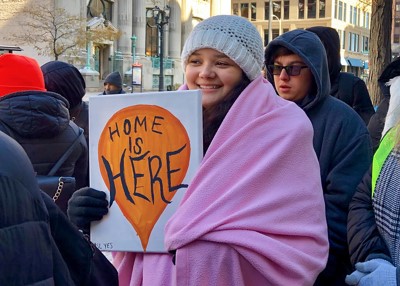On July 16, a federal judge in Texas ruled that Deferred Action for Childhood Arrivals (DACA) is unlawful, blocking the government from granting new and pending applications and throwing the fate of the program into question yet again. While current DACA recipients may continue to live and work in this country without fear of deportation for now, the court ruling upended the lives of hundreds of thousands of immigrant youth and their families whose hopes of building a better future rested on DACA. The reverberating impact will be felt throughout the communities and institutions DACA beneficiaries have enriched as friends and neighbors, students and teachers, leaders and volunteers, colleagues and essential workers. Litigators are hard at work fighting to make sure this decision does not stand.
Friday’s federal court ruling underscores the need to bring relief and stability to immigrant communities with a permanent legislative solution. Although DACA has proven to be a resounding success—allowing beneficiaries to pursue further education, earn a better living, and support their families—and garnered overwhelming public support, it was always intended as a temporary measure. Moreover, since its inception in 2012, DACA has been under attack by xenophobic forces driven by racist, white nationalist, and exclusionary ideology. As such, DACAmented and DACA-eligible immigrants and their families have lived in a constant state of fear, tumult, and uncertainty, their dreams and their very sense of safety subject to ever-changing political winds. This situation is neither fair nor sustainable, and it not only hurts Dreamers but damages our communities as well.
Over the past decade, philanthropy has played an important role in ensuring DACA’s success through GCIR’s Delivering on the Dream initiative. More than 100 foundations nationally and in 21 states invested and leveraged nearly $80 million to provide eligible immigrants with access to this life-changing program. Local, state, and national funders delivered on DACA’s promise through collaboration and coordination. Today, philanthropy can build on these accomplishments to meet the new challenges before us.
To dismantle structural racism and build strong, welcoming, fully inclusive communities, we must go beyond DACA to establish a pathway to citizenship for Dreamers, their families, and the 11 million undocumented immigrants who call this country home. As we speak, organizers and advocates on the Hill are advancing and shaping legislation to make America safer for Dreamers, Temporary Protected Status (TPS) holders, and essential workers, including farmworkers.
We urge philanthropy to:
- Support advocacy efforts for a pathway to citizenship, such as the We Are Home campaign, whose leadership is comprised of a wide array of immigrant justice organizations, including directly impacted groups.
- Resource the parts of the movement that may be vulnerable to possible tradeoffs in the congressional process by investing in campaigns such as Welcome With Dignity, which works to protect asylum seekers, and New Way Forward, which seeks to disentangle the U.S. immigration and criminal justice systems.
- Fund immigration legal services programs that will be called on to field questions from community members and help them navigate the implications of the federal court decision.
GCIR stands with Dreamers and all immigrant communities, who have built a powerful movement and demonstrated their resilience time and again. We will continue mobilizing philanthropy to make our shared dream of immigrant justice and belonging a reality.
Photo credit: "DACA-52" by Susan Ruggles Licensed under CC BY 2.0
